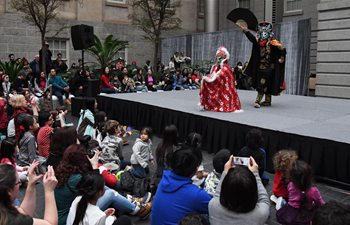URUMQI, Feb. 13 (Xinhua) -- As the sun went down behind the snow-covered peaks of the Tianshan Mountains and night was about to fall, Elxat, riding a chestnut-colored horse, called out to the three men behind him: "Hurry up, we have to reach Ashaltor before 7 p.m."
Ashaltor is one of over 30 hostels, known locally as "transit houses," on the remote 2,200-square-km Bawzader pasture in Xinjiang Uygur Autonomous Region. Just like hostels, they provide food and shelter to herders who come to the pasture in winter when the sunshine is abundant, and the deep valleys protect their cattle and sheep from wind.
But Elxat is no herder. As head of the pasture clinic, he and three other doctors ride horses to the pasture every winter to treat sick herders in the secluded mountain area.
The only path to the remote pasture is riding along tracks set among cliffs and valleys. The area has no tap water, communication signals or Internet, and the only power supply comes from solar panels. It is almost impossible for herders to make their way to hospital when the snow is heavy.
When the doctors finally arrive, host Yedeli welcomes them at the solar-panel-powered wooden house. The 40-square-meter home has three bedrooms. Yedeli serves them with hot tea and bread. Air-dried beef boils in a pot and will soon be ready.
Different from regular hostels, the transit houses are free of charge. The hosts are elected by villagers and subsidized by the government.
The hosts must be friendly and hospitable otherwise disgruntled herders may report them to the village committee.
"The government gave me an allowance and allotted a pasture for me, so it's my duty to take care of passing herders," says Kadirbay, who has been the host of another transit house for 21 years.
The time between October and March is quite busy for the transit houses, when thousands of herders come for the winter pasture.
"During this time, I barely have enough time to sleep because I help them take care of the herds and my wife prepares food for them," Yedeli says.
Even during off-season, Yedeli has to make sure that his house has enough food and quilts to accommodate at least 20 people at the same time.
In order to reach all the herders, Elxat and his colleagues make at least three journeys every winter, each lasting 10 to 20 days.
There is no time for them to stay longer. It usually takes a day's ride to reach the next transit house. The next morning, Elxat and his colleagues hop on their well-fed and well-rested horses and hit the road once more.













